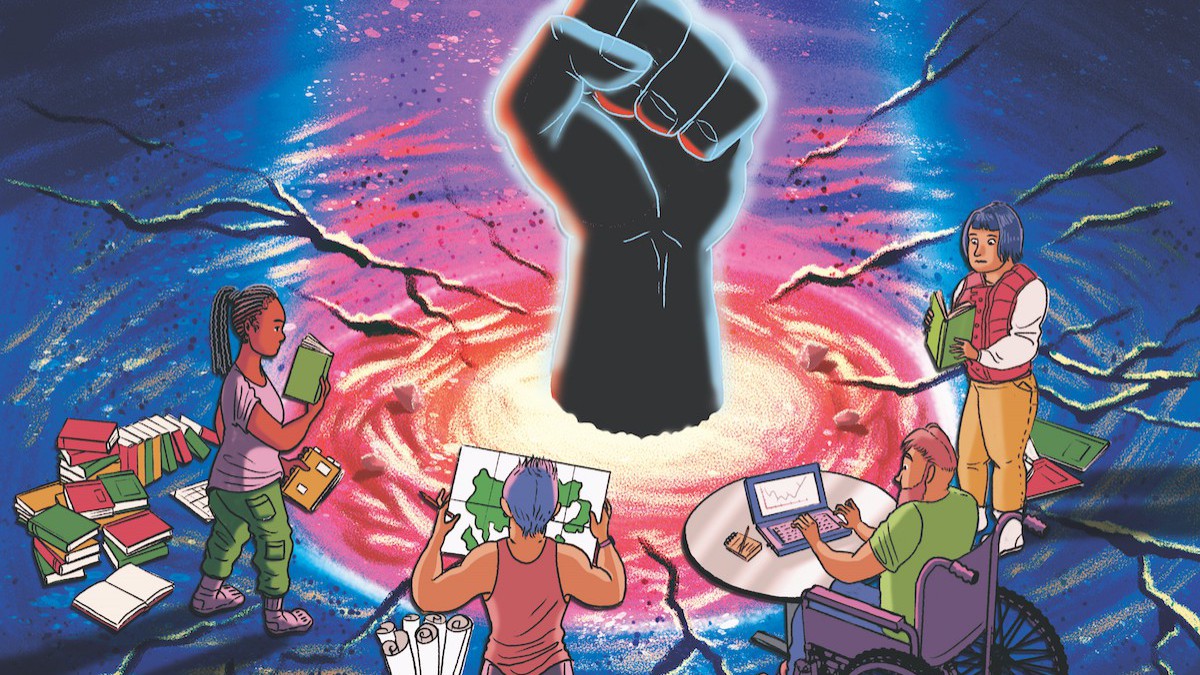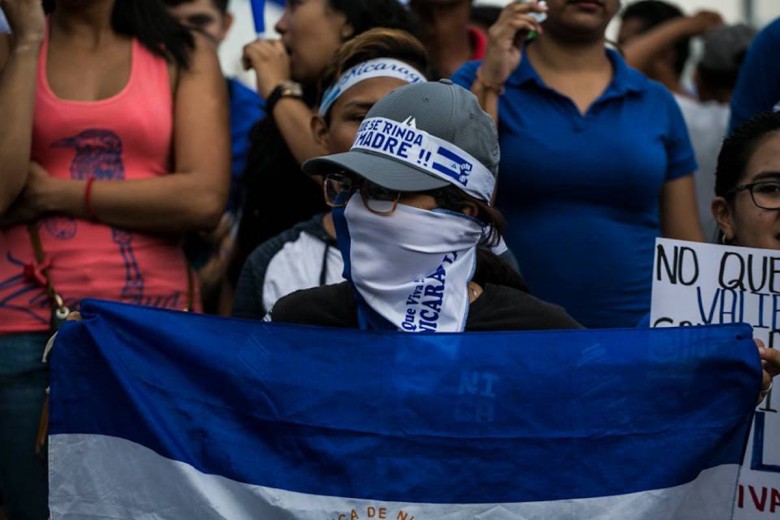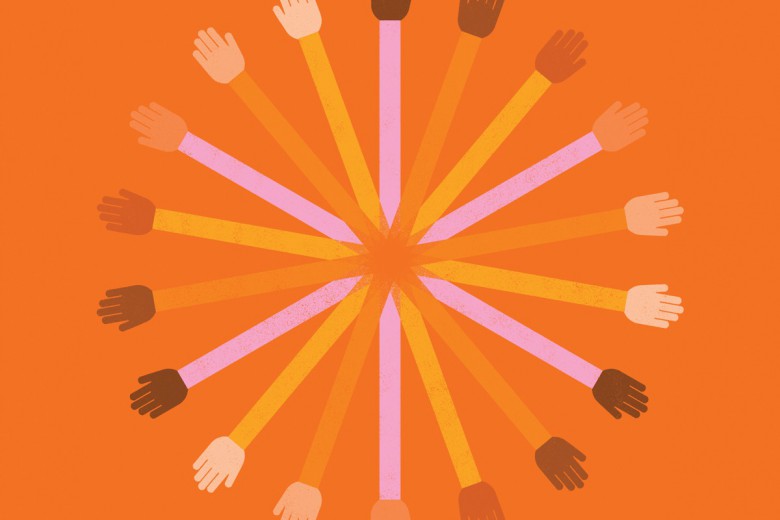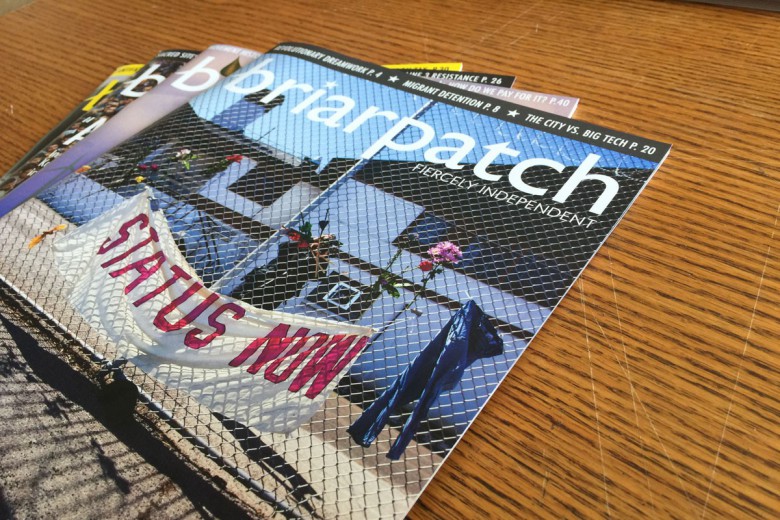On December 8, 2021, Research for the Front Lines hosted an online Q&A session with long-time activist, writer, and educator Chris Dixon. Research for the Front Lines is a new initiative that brings together grassroots movements and communities on the front lines of the fight for environmental and climate justice with researchers who have skills, time, and labour to offer. We help establish and support research collaborations that challenge extractive, colonial capitalism and promote just, flourishing alternatives.
The event, entitled Movement-led Research: In Conversation with Chris Dixon, was organized as a learning opportunity for Research for the Front Lines’ volunteers and partners. Hosted by Jen Gobby, activist-scholar, lecturer, and director of Research for the Front Lines, the conversation focused on the skills, principles, and approaches to research with and for social movements, resisting institutional pressures from universities, and building relational accountability with movements.
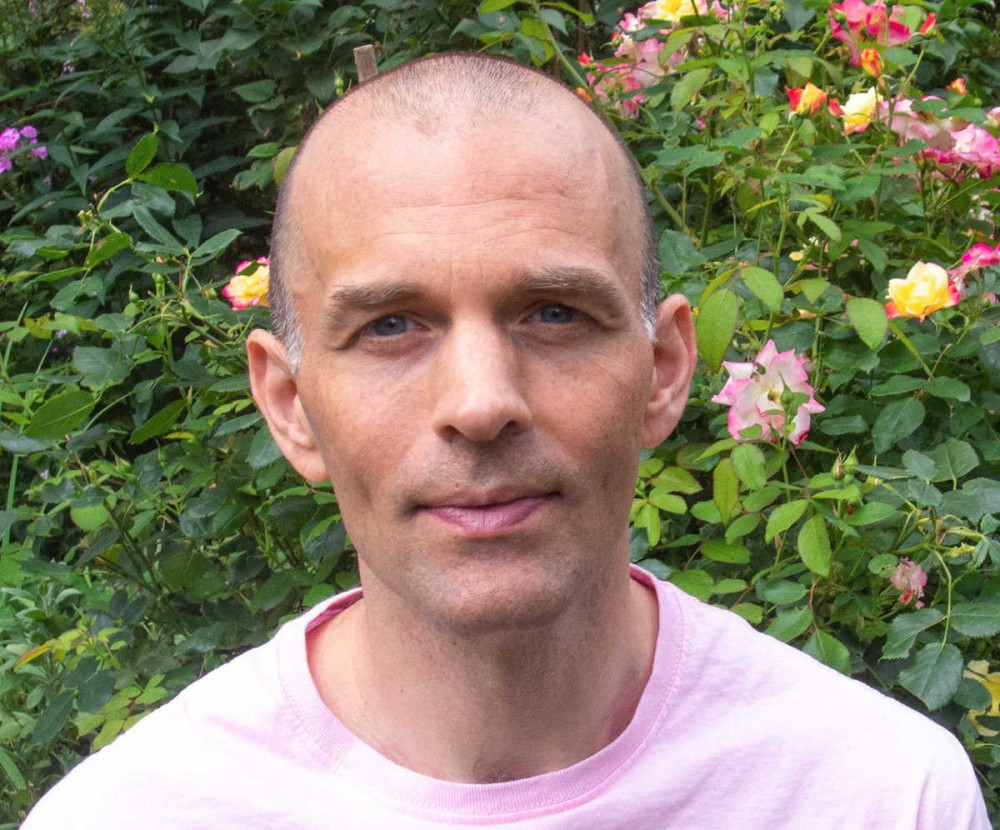
Chris Dixon, originally from Alaska, is a longtime anarchist organizer, writer, and educator. He lives in Ottawa, on unceded Algonquin territory, where he is a member of the Punch Up Collective.
JG What was your entry point into research with movements?
CD I grew up and was politicized in Anchorage, Alaska, on Dena’ina territory. That profoundly shaped how I think about settler colonialism, capitalism, and extractivism. I spent many years living along the U.S. west coast, where I went to university and was involved in a variety of social and ecological justice organizing efforts. As part of those efforts, I helped to organize the mass direct action protests that shut down the 1999 World Trade Organization ministerial meeting in Seattle. In the wake of those actions, I was deeply involved in what we now call the global justice movement.
In 2002, I started a PhD program in Santa Cruz, California. I had no intention of becoming a professor, but I was eager to use university resources to support the surging movements with which I was connected. For my dissertation, I travelled to cities across North America and conducted interviews with other longtime anti-authoritarian organizers, talking about lessons we were learning, challenges we were facing, and big questions with which we were grappling. I eventually published that research as the book Another Politics.
The years of interviews and writing forced me to think about how to collaborate with people engaged in movements in an ethical way that could further the politics that I care about.
JG What role can research play in transformative struggles for social and environmental justice, and in what ways can it harm?
CD There’s a spectrum of possibilities for what research is and does. On the harmful end, think about the Canadian Security Intelligence Service, Canada’s spy agency. It has a long track record of researching transformative movements and communities in struggle; they research us because they see us as a threat. Or think about geological research. So much of it is in the service of fossil fuel companies whose aim is to make a profit through dispossession and ecological destruction.
I raise these examples because it’s important to think about research that’s actively aimed at undermining our organizing efforts and is actively involved in destroying the world.
There are also forms of research that are more inadvertently aligned with harm. Here we can think about social science disciplines that have long histories of furthering colonialism and capitalism. Take political science: it’s a discipline that in many ways adopts the language and orientation of dominant institutions, and it rarely calls into question any of the major systems of oppression and exploitation that operate through the state.
On the other end of the spectrum, I look to forms of research that are about very consciously contributing to struggles to overturn the existing order and build a more just, sustainable, and equitable society. That necessarily means confronting ruling institutions and relations.
We can think about people who do legal research to help Indigenous land defenders who’ve come under attack by the state. We can think about people who research supply chains – major conduits of dispossession, exploitation, and profit-making on a global scale – in order to advance campaigns against sweatshops.
The research that’s closest to my heart involves engaging with movements directly to elaborate the knowledge that we’re developing together, as we struggle. This involves collectively sharpening our own analytical tools, organizing approaches, and capacities through sharing lessons and reflections.
JG What are some of the barriers you see for folks who are trying to do this kind of movement-engaged research?
CD There are so many forces that move even the most good-hearted researchers into alignment with ruling institutions and away from alignment with transformative movements. It’s a kind of gravitational pull. Those of us who have spent time in academic settings have likely seen or felt this pull ourselves.
Much of this has to do with time and resources, which are often allocated based on how closely you follow a particular program. If you’re a student, that’s about you getting through your course requirements and producing work that fits with university expectations. If you’re a professional academic, that’s about getting grants and getting published in the right places. In many ways, your access to time and resources is governed by a matrix of institutional power.
This produces a particular form of accountability – to the university and, more specifically, to those who teach, supervise, and evaluate you in the university. When we’re doing research alongside movements, we can face real disdain and sometimes material punishments for choosing to direct attention and resources toward people who are doing disruptive things that are unsettling for ruling institutions. And this makes it harder for us to develop sustained connections with movements, organizations, and people who are engaged in struggle, for whom the university is not their primary reference point.
Also, one of the fundamental organizing functions of the university is to get us to understand ourselves primarily as individuals. We’re supposed to pursue our own, very individual career trajectories through the institution, whether as students or workers. That makes it harder to build relationships that can resist the gravitational pull.
JG So, how do we resist the gravitational pull?
CD My main suggestion is to find other people. Build collectivity! This is a really basic point but I think it’s fundamental. It’s so much easier to push back against institutional pressures when we have other people alongside us, whom we’re talking with, whom we’re sharing strategies with, and whom we’re pooling resources with.
I’m not necessarily talking about starting an organization. Find two or three other people that you’re on side with, and figure out how you can start supporting each other. Brainstorm together about what you’re doing, what you can get access to, and what you can push up against. How far can you contravene some of the institutional pressures that you’re facing? It’s going to be easier if you’ve got a few people who have your back.
It’s also much easier to collaborate with communities in struggle when we approach them as collectivities rather than as lone individuals. Many people involved in movements are justifiably skeptical of individual researchers, who often bring their own agendas and priorities. But when we form collectivities – teams, collectives, groups, and other formations – we can set up more deliberate relationships with one another and with movements. And as part of this, we can intentionally work on developing more accountable relations.
The university, as I said, sets up a particular kind of accountability. But what other kind of accountability do we want to build?
In his book Research Is Ceremony, Cree scholar Shawn Wilson builds out a concept of what he calls “relational accountability” in research. I take a lot of inspiration from that idea and, as a non-Indigenous activist-researcher, I also want to be careful about not lifting it out of its context. One question it raises for me: what would it mean for researchers to participate in relations of accountability as part of transformative movements?
There’s a lot to explore with that. One direction is to consider how we determine what we research. If we go with the gravitational pull of the university, what we research is going to be based on a complicated mix of what happens to be trending academically in our field, what we can find resources and support for, and what we happen to have some interest in. But in the spirit of relational accountability, maybe we should consult with people involved in movements we care about and ask them what kinds of questions are worth researching.
Let me give you an example. In 2007, as a PhD student, I was interviewing an organizer with the Ontario Coalition Against Poverty. I was asking him questions about their influential approach to direct action anti-poverty organizing. At one point, he said, “you know, we’ve had so many academics over the years who’ve approached us and wanted to research us, but none of them have ever asked us, ‘what kind of research would be useful for OCAP’s organizing?’” He went on to list a whole bunch of lines of inquiry that would be helpful, including research on the individuals and organizations propelling gentrification and dispossession in downtown Toronto.
That conversation has stayed with me. The main point I take is that perhaps we shouldn’t start with whatever question happens to be hitting us, but instead, we should develop questions in collaboration with people in struggle who are knowledgeable and have a clear sense of what’s at stake.
Inspired by the activist-geographer Laura Pulido, another way I think about accountability has to do with reciprocity: as researchers, what are we actually offering? And whom are we offering it to? The prevailing approach is that researchers write articles and give presentations. Those can be useful, but maybe they’re not always the most important? Let’s consider other ways that we can offer our labour and resources. These might include helping to build a popular education curriculum, doing some research to further a campaign, or taking on crucial but less glamorous organizing tasks, such as providing child care, making banners, or setting up for meetings.
Not everything we do, as researchers working alongside movements, is going to be legible or even welcome within universities. That’s okay! Resisting the gravitational pull requires us to stay focused on movements and struggles.
JG What advice do you have for researchers who are not affiliated with a university for getting started or involved in movement-led research?
CD There are different kinds of challenges and opportunities for those of us who are not in or adjacent to universities. One of the challenges is that we may not have access to the same kinds of resources, whether that’s digital access to journals, financial support, or institutional legitimacy. On the other hand, we’re not bound by any of the expectations and guidelines that govern so much university-based research. For instance, we don’t have to wade through institutional ethics protocols in order to interview people.
One of the real opportunities for independent researchers is in entirely bypassing universities and connecting with movements directly. We can seek out collectivities of people in struggle – organizations, campaigns, and so on – and offer our time and skills. We can inquire about what people need and try to figure out what we can access in order to meet those needs. And we don’t have to worry about trying to justify that within an academic context at all.
But the thing that we need to work on is building durable relationships with movements and communities in struggle. Otherwise, it can feel like we’re just floating. And here again, I have the same advice for people both in and outside of academic institutions: don’t go it alone. Find other people – even just a couple of other folks who are interested in doing research for social justice – who are perhaps similarly situated as you. Figure out how you can connect, what you can start together, and what you want to accomplish.
JG Where have you seen this go bad?
CD I’ve heard stories from activists who have been quoted or portrayed in published material without their consent. One friend, for instance, told me about being named and quoted in a book and said, “that researcher never asked me whether they could include this in print.” Along similar lines, researchers have sometimes documented discussions within organizations without checking to see whether it was okay to share those discussions publicly.
There are at least two ways this can be very bad. One is that activists are portrayed in ways that don’t accurately represent their ideas and efforts. The other is that they’re described in ways that accurately represent them but also endanger them or undermine their objectives.
I’ve also seen people who’ve done quite principled research, who’ve tried to be accountable. But when they get to the stage at which they are writing their thesis, article, or book, they cut off contact with those with whom they’ve been engaged. In those situations, it seems like the researchers just didn’t know how to navigate the space of turning what was a collaborative process into something that fit within academic or publication expectations. This usually creates a lot of conflict around the final product because there had been a pretty good process, but then that process was severed from the final outcome.
While I understand the pressures that produce that kind of circumstance, I want to point out that it can be tremendously damaging to other attempts at building accountable relationships. It really undermines trust.
JG Earlier you mentioned collective knowledge created in movements and how we can work together to sharpen the tools of organizing. Would you elaborate more on this?
CD In 2005, when I was an angry graduate student, I published an article with my friend Doug Bevington titled “Movement-Relevant Theory.” We basically criticized much of the existing scholarship on social movements. Part of what we emphasized – and I continue to stand by this – is the significance of what we called “movement-generated theory.”
We made a basic observation based on our own experiences: if you spend any length of time in a movement, you’ll see that people are constantly theorizing. They’re coming up with new ideas, new ways of understanding things, of critically assessing the terrain of struggle on which they fight. And of course, every movement has its own internal conflicts and debates, which are also important forms of movement-generated theory.
The late Aziz Choudry, a longtime activist who became an ambivalent academic later in his life, did a tremendous amount of work to explore this intellectual work in movements. I particularly recommend his book Learning Activism.
So, any time we’re trying to do research with movements, I believe that movement-generated theory should be the starting point. What are the questions, debates, and ideas that people are already engaged in producing? How can we develop and deepen these, collectively?
Now, that’s not necessarily a useful starting point for when we’re researching our enemies. But I think it can still offer some grounding, even as we research ruling institutions in grim circumstances. I’ll give you an example of this, which comes from my political collective, Punch Up. We spent much of 2021 carefully combing through a decade’s worth of reports to learn about complaints against the Ottawa Police Service. We were trying to understand how much damage they are doing in our city and how they account for it. Of course, their accounting is terrible. For me, doing this research was really quite devastating because it’s all about the cops hurting people in the place where I live.
As hard as it was, doing that research was a conscious contribution to the defund campaign in Ottawa. We wanted to examine the complaints and understand better how the cops evade any accountability or criticism. Throughout, for me, it was important to keep going back to the visionary ideas of the Movement for Black Lives and abolitionism. The collective knowledge developed in those movement efforts suggests that there’s a whole other way that we could be living, one that doesn’t require the carceral state. Movement-generated theory can offer so much fuel for our imaginations and actions.
This transcript has been edited for length and clarity. It has also been slightly expanded to include additional examples. For the full transcript, see the “resources” page of researchforthefrontlines.ca. For further reading, see Jen’s website, jengobby.ca, and Chris’s website, writingwithmovements.com.


